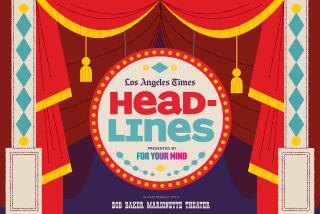‘I Think Humor Helps,’ Therapist Says : Laughter Used to Treat Mental Illness
- Share via
SEATTLE — Robin Faye-McNair has several prescriptions for her psychiatric patients at University Hospital--drawing cartoons, watching soap operas and wearing Halloween masks.
The occupational therapist firmly believes in the cliche that laughter is the best medicine, especially when it comes to healing emotional wounds.
“I think humor helps because you can look at different areas of your life without making it so serious,” Faye-McNair said. “It allows people to relax a little bit and open up.”
Cartooning as Therapy
Faye-McNair, who is an amateur cartoonist, encourages her patients to express their feelings by drawing cartoons, which she says makes it easier for them to discuss and cope with their problems.
“Sometimes it’s kind of hard to express emotions and things that people keep hidden,” she said, adding that patients who can sketch their feelings in cartoon form “don’t feel as threatened.”
For patients who have difficulties with interpersonal relationships, Faye-McNair turns to episodes of a daytime soap opera. After patients watch a show, they discuss the characters and how they manipulate one another.
“Soap operas are . . . so extreme it borders on humor,” Faye-McNair said. “They help patients see they’re acting out a role. It allows them to see options or other ways of behavior.”
Masks Depict Moods
She also has a collection of Halloween-type facial masks, with expressions ranging from sad to angry to happy, and encourages patients to wear a face that depicts their mood that day.
“When you put on a mask, it really puts you much more in touch with your physical body,” Faye-McNair said.
Patients who benefit from her special brand of therapy are suffering from a range of mental problems, including anorexia, depression or low self-esteem. Since each patient has specific needs, Faye-McNair admits approaching problems from the bright side doesn’t always work--at least not right away.
“I sort of see myself as planting some seeds. If it’s done in a way that gives people the opportunity (to be humorous), but doesn’t force them, they may take up on it later,” she said.
One patient who blossomed under Faye-McNair’s approach was DeeDee Murry, 23, who entered the program suffering from anorexia nervosa.
Humor ‘Was Good for Me’
“When I first came I wasn’t very receptive,” Murry said. “I had a lot of trouble in showing emotions. The humor group was very good for me.”
Faye-McNair proudly shows off a cartoon that Murry drew to express her feelings about her five-year battle with anorexia, an eating disorder in which patients starve themselves to assert control over one aspect of an otherwise uncontrolled life.
In the expertly drawn cartoon strip, Murry is arguing with a devil, representing anorexia, about her need to consume a dietary supplement prescribed by the hospital.
After 14 weeks of treatment, Murry left the hospital and now returns once a week as an outpatient. But she believes she is well along the road to recovery, and attributes much of her progress to the humorous approach.
“I’m using humor at home now,” said Murry, who lives with her parents in Chehalis, Wash. “We’re talking things out.
More to Read
Sign up for Essential California
The most important California stories and recommendations in your inbox every morning.
You may occasionally receive promotional content from the Los Angeles Times.













